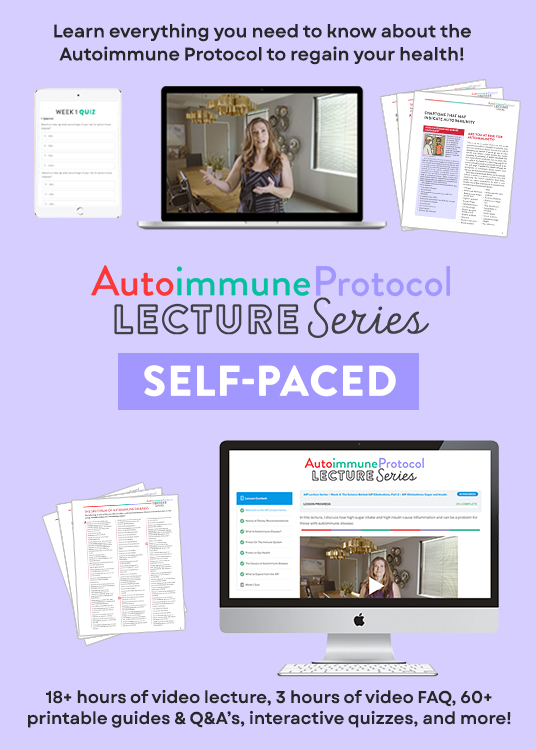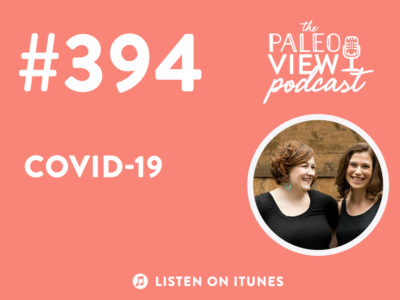On this week’s episode, Stacy and Sarah address all things coronavirus, also known as covid-19. What exactly is this disease? What are the symptoms? How is it spread? And what can we do to reduce our risk of infection? All of this and more in episode 394!
Table of Contents[Hide][Show]
- The Paleo View (TPV), Episode 394: covid-19
- What is covid-19?
- The Symptoms
- Vulnerable Populations
- Transmission
- Is this a pandemic?
- Reducing Exposure
- What to Do If You Think You Have It
- Supporting Your Immune System: Sleep
- Supporting Your Immune System: Stress Management
- Additional Steps to Take
- Closing Thoughts
If you enjoy the show, please review it on iTunes!
The Paleo View (TPV), Episode 394: covid-19
Welcome to episode 394 of The Paleo View. (0:40)
This week Stacy and Sarah thought it would be good to discuss what you can do to prepare yourself for the incoming coronavirus.
Stacy and Sarah will focus on how we can become educated on what this virus is and what we can do to protect our health and the health of our loved ones.
It is going to get a little scientific, but the goal is to give listeners solution-oriented ideas to move forward with.
One of the challenges that we have right now with covid-19 is that there are a lot of unknowns.
This episode is being recorded on Tuesday, March 3, and Sarah is going to present on the latest science available through that point.
The goal of this show is to cut through the hype and fear.
Sarah wants to provide listeners with science-based information and action steps for preparation.
Specifically, the focus is going to be on diet and lifestyle things that you can do to support your immune system.
Save 70% Off the AIP Lecture Series!
Learn everything you need to know about the Autoimmune Protocol to regain your health!
I am loving this AIP course and all the information I am receiving. The amount of work you have put into this is amazing and greatly, GREATLY, appreciated. Thank you so much. Taking this course gives me the knowledge I need to understand why my body is doing what it is doing and reinforces my determination to continue along this dietary path to heal it. Invaluable!
Carmen Maier

Sarah’s inbox has been flooded on questions around covid-19.
In response, Sarah has decided to put together a free e-lecture series called Immune Health on a Budget.
It will be available on March 25.
However, you can sign up now to make sure you have access to that once available.
What is covid-19?
Covid-19 is the name of the illness that is caused by this new novel coronavirus.
The virus has been named by the International Committee on Taxonomy of Viruses.
This virus has been called SARS-CoV-2.
It is an RNA virus.
Some of the symptoms are from our immune system activation, and some are from the damage being caused by the high viral load.
Where this came from will be more fully understood in time.
This one appears to be zoonotic.
It likely originated in chrysanthemum bats and passed onto humans via pangolin.
The very good news is that this virus is not mutating very quickly.
It makes it easier for studies to conduct research since it is not a moving target.
The Symptoms
Something like 80% of people who get covid-19 get what is like a mild head cold. (8:54)
There is already some evidence that there are people who can be completely asymptomatic.
The vast majority of cases are mild.
83 to 90% of patients who seek medical care have a fever.
46 to 82% have a cough.
31% have shortness of breath.
11 to 44% have fatigue or muscle pain.
There have been some other symptoms reported without a good idea of their frequency.
These are sore throat (especially early on), abdominal pain and diarrhea.
Low white blood cell count is common, and also elevated liver enzymes.
In the severe course of the disease, this is causing viral pneumonia.
Most of the data that we have is out of China, and we can expect these results to look fairly different when covid-19 hits other countries.
This is preliminary data that will change in the days and weeks to come.
Vulnerable Populations
Older patients appear to be more vulnerable to the disease. (13:05)
The median age of the infected is in the 50’s.
The median age of the people who have succumbed to covid-19 is around 70 and typically have had other chronic health problems.
These health problems include diabetes, high blood pressure, and cardiovascular disease.
23 to 32% of patients have a severe course (viral pneumonia) requiring intensive care for respiratory support.
This is likely an overestimation because the minor and asymptomatic cases are not being counted very well in most places.
Similar to H1-N1 in 2009, the preliminary data looked scarier than it turned out to be.
Among those patients that were hospitalized for viral pneumonia from covid-19 in China, there is about a 4 to 15% mortality rate.
The overall mortality rate is estimated at around 2%.
This is very likely to change since mild cases are not being accounted for very well.
It is very important to understand where these numbers are from and how they are likely to change.
Transmission
The incubation period ranges from 1 to 14 days.
Although recent case reports suggest that the incubation period may be as long as 24 days.
This will become more clear as we have more data.
Currently, it is believed to be primarily transmitted through respiratory transmission. (21:15)
There have been some other tests showing RNA in stool and blood, so there may be other modes of transmission.
If confirmed that the virus can be spread by stool, then different types of precautions may be necessary.
Transmission from an asymptomatic or presymptomatic carrier appears to be possible, which, if confirmed in larger studies, will have important implications for screening and isolation.
The reproductive number (R0) (the expected number of secondary cases produced by a single infected person in a susceptible population) is between 2 and 3.
Instead, many people may be asymptomatic or have very mild symptoms and are spreading the virus without knowing it.
Is this a pandemic?
An epidemic is an illness resulting in death with sustained person-to-person spread within a community. (25:46)
A pandemic is an epidemic that is occurring in multiple countries with worldwide spread.
Covid-19 is in 64 different countries, which definitely counts as worldwide spread.
As of right now, it looks like it is isolated to certain spots, which is why the WHO has not yet declared covid-19 a pandemic.
Where Sarah is getting this information is not from media sources.
There have been over 400 scientific studies that have been published already on this virus and this outbreak.
These are Sarah’s primary sources of information on this topic.
The WHO and CDC have been great sources of information providing actual data.
The question when we talk about a global pandemic is what percent of the population could end up being infected.
This is something that is very hard to predict.
Right now there are a lot of scary stats that are being reported through media channels.
Covid-19 is potentially a little bit more infectious than the flu.
However, we need more data to really understand this detail.
The country that has had the most aggressive testing so far is South Korea.
Sarah shared more information on South Korea’s data and what this will represent on a global level.
Reducing Exposure
The CDC guidelines recommend staying home when you feel sick. (32:01)
Regardless of whether or not you think you could be sick with covid-19, this is how you prevent spreading germs to others.
Stacy also encouraged leaders to make this point very clear to their team members.
This will especially help vulnerable populations.
Only 5% of Americans wash their hands properly.
Sarah fully admits that until a few days ago, she was part of the 95% of Americans.
There are tons of studies showing that washing your hands can dramatically decrease infection rates.
Avoid touching your eyes and mouth.
To properly wash your hands, scrub them with soap on them for 20 seconds.
Wet them, put soap on them, lather up your hands, and then rinse.
Wash under your nails and between your fingers.
If you are in a public bathroom, turn off the faucet with the paper towel you are drying your hands with.
Also open the bathroom door, when in public, with the same paper towel you used to dry your hands.
This virus is very susceptible to soaps and cleaners.
Anything you are already using is probably great.
Sarah has everyone wash their hands when they come in the door, before setting the table, handling food, eating, going to the bathroom, or if anyone coughs or sneezes.
The CDC is also recommending that people avoid high-risk areas and very crowded places.
Another key recommendation is that most people do not need to wear face masks.
The only masks that are actually effective are N-95 and higher-rated masks.
There may be a shortage and medical personnel may not have appropriate protection.
If you are not a high-risk individual, do not horde N-95 masks.
What to Do If You Think You Have It
Testing in America is about to become much more widespread. (41:10)
If you think you have covid-19, whether or not you have traveled, go to the doctor and get tested.
Quarantine yourself to minimize your exposure to others.
Do all the things you would do to recover from the cold and flu.
Rest, hydrate, and seek medical intervention if needed.
Don’t be a hero.
There are people who need supplemental oxygen or ventilation support.
Antivirals have had some success in preliminary clinical trials, be open to medical intervention.
This is not the time to be skeptical of the medical community.
Avoid corticosteroids unless indicated for some other reason.
Seek a second opinion if you are prescribed corticosteroids.
Sarah thinks it is very important right now to protect others.
So if you are sick with anything, stay home and don’t expose others.
Supporting Your Immune System: Sleep
All of the things that Stacy and Sarah talk about on this podcast are important for reducing inflammation. (45:09)
These are the things that are easy to let slide when life gets busy.
This is an important time to reflect on what we are doing diet and lifestyle-wise and see where we can improve so that we can best support our immune systems.
Sarah is going to cover all of this stuff in greater detail in her lecture series, which you can sign up for here.
Take the anxiety you are channeling into the unknown of covid-19 and turn it into better implementation of diet and lifestyle choices.
Use this as a motivator to make a change.
The top area of focus to look at is sleep.
Getting proper sleep is critical to immune function.
There was a well-designed study published in 2015, looking at 164 people.
They were first screened using an actiwatch for 7 consecutive nights to measure sleep.
They also kept a sleep diary (questionnaires for control variables)
After being segmented based on the initial data, they were isolated in a hotel for 6 days.
On day 1, rhinovirus was administered nasally.
Data was measured for those 6 days, and follow up was done at 28.
Sleep duration was the biggest predictor of whether or not the people would get a cold (not sleep fragmentation or sleep efficiency).
If sleep is not dialed in for you, this is the time to do it.
Sarah recommends being in bed for 8 1/2 to 9 hours before your alarm goes off.
Supporting Your Immune System: Stress Management
Stress is about the same in terms of the impact it can have on our susceptibility to infection.
There was a similarly designed study using a stress index.
The more stressed a person was, the more likely they were to get that virus that they were exposed to.
The high-stress people had a nearly sixfold increase in infection rates.
There were other studies with similar findings.
Stress and sleep go together.
It is really hard to work on one and not work on the other.
The best thing you can do to support your sleep is to manage your stress and go to bed at a regular time.
The best thing you can do to reduce your stress is to get enough sleep.
Mindfulness practices, going for a walk outside, and other calming practices can all help here.
Additional Steps to Take
The last lifestyle thing that is really important is getting lots of low and moderate-intensity activity while avoiding strenuous or high-intensity activity. (58:28)
All of these lifestyle factors work together.
In terms of nutrition, vitamin D levels will make a difference to your immune health.
Be sure to refer to this episode, but getting tested and supplementing as needed is recommended.
Also up your nutrient density focusing on antioxidants, fiber and vitamin C.
Eat tons of veggies and fruit.
Eating three or more servings of fruit a day causes a reduced rate of upper respiratory infections.
If you are going to have eight servings of fruits and vegetables a day, have five be vegetables and three be fruit.
Vitamin E is another important nutrient for supporting the immune system.
We can get this nutrient through olives, avocados, olive/avocado oil, nuts, and seeds.
Omega-3’s are also very important.
Too high fat can be problematic for immune function, so be sure to balance your macros.
Vitamin A and vitamin D coming from liver and other organ meat is important.
Zinc from shellfish is very important as well.
A healthy gut microbiome can improve our ability to fight off an infection.
Getting probiotics from fermented foods is great, but supplementing with a probiotic is a great idea as well.
Stacy and Sarah prefer Thrive probiotic.
You can save 15% off with the code ‘PaleoView15’.
Closing Thoughts
We are still waiting for more data on covid-19, but fine-tuning your diet and lifestyle habits is the thing you can do to prepare right now.
Stacy is looking at the things she can change in a realistic and sustainable way.
Don’t let this full list of recommendations overwhelm you so that you do nothing.
Ask yourself what habits changes feel manageable to you.
Reminder: Immune Health on a Budget, which will go into detail on how we can support our immune systems in the face of covid-19, will be FREE and live on March 25th.
Sign up to watch it live here.
If you can’t watch it live, sign up so that you receive the replay.
Sarah is hoping that by March 25 we have more data to act on
Stacy thanked Sarah for pulling together all of this information.
Thank you for listening, and be sure to send follow up questions to Stacy and Sarah!
We will be back again next week! (1:13:53)
—
Monica Kenney | (651) 600-7916




 Natural Approaches to Cold & Flu Season (and Covid-19!)
Natural Approaches to Cold & Flu Season (and Covid-19!)